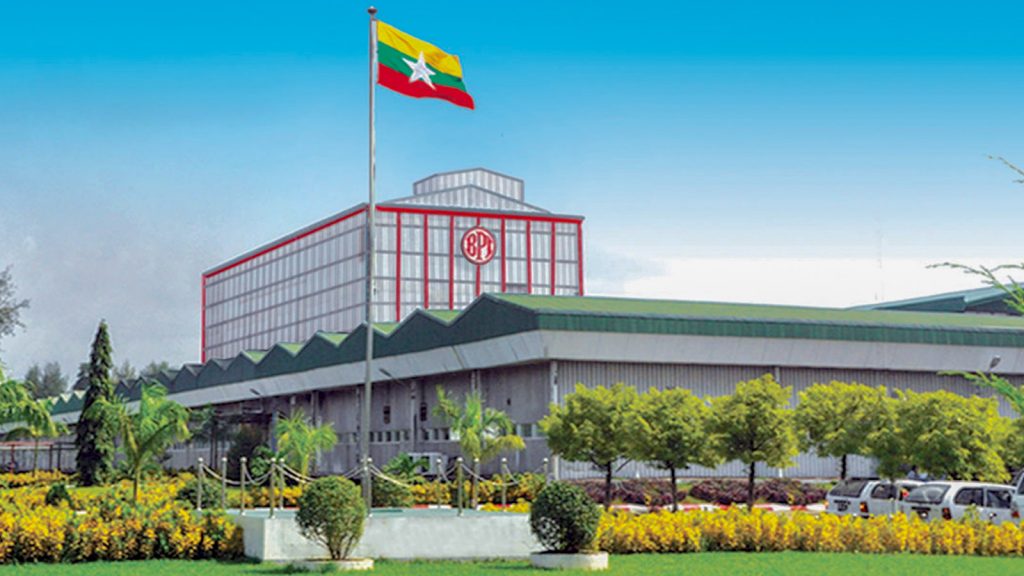9 June
About 2 miles 5 furlong west of Hanmyintmo in central Myanmar’s Mandalay Region Kyaukse Township is Inyaung Village. Near the village is Myanmar Pharmaceutical Industry’s newest plant Inyaung. The new plant is situated on 31.57 acres of land. It was producing 3 types of disposable syringes, injections and intravenous solutions that are in much requirement for the country’s health sector.
The new Inyaung Plant was opened on 19 January 2008. A Large Volume Parenteral Solution Production Plant was added to the plant and opens in 5 April 2019. In addition to the disposable syringes it was producing 5 types of Intravenous solution, 17 types of injections, 5 types of Antibiotic, 7 types of powders, an eye drop and two types of Irrigation Solution.
Myanmar Pharmaceutical Industry had been producing medicines and health care products under its famous brand name BPI. With the addition of the new plant in Inyaung it will be increasing the production of intravenous solutions from 2 million to 8 million. Later the production will be increased up to 10 million in Inyaung alone and it will become an important medical production center for Myanmar’s more than 50 million population.
Manufacturing process of intravenous solution
The most important item in the manufacturing of intravenous solution is the production of Water for Injection. The water was obtained from a tube well in the plant. The water was filtered and minute solids were removed with Poly Aluminium Chloride through sedimentation. Smells and organisms were removed through Sodium Hypochloride, Activated Carbon Filtration and Sand Filtration.
The purified water were then stored in 50,000 gallon ground tank and then filtered in a clean room by ultrafiltration. When Cations and Anions were removed with Reverse Osmosis (RO) and Eletrodeionization (EDI) machines the water became Demineralised Water.
The demineralised water was then passed through distillation columns and filters to become water for injection. The waters were also maintained at above 80 degree Centrigrade as living organism starts to grow beneath that temperature.
Raw materials for manufacturing medicines in WHO Standard and GMP Guideline were weighed in chemical weighing room and then made into liquid medications. Bacterias and pyrogens in the liquid medications were also removed using Cartridge Filter and Seitz Filter Sheets. Liquid medications produced in such were then bottled using Blow-Fill-Seal Machines. The advantage of BFS directly imported from US was prevention of the intrusion of outside minute particles.
Capping machine with electric welding was used to cap the bottles and the bottles were sprinkled with 108 degree centigrade hot waters.
In addition to making a final visual inspection, the bottled liquid medications were tested on mice and rabbits to ensure inclusion of harmful elements. Only after all these were conducted were the liquid medications distributed into the market.
Production from Inyaung plant
Inyaung Plant also produces four types of electrolyte beverages, PS Solution 3 liter and 5 liter, one type of ½ PS Solution, Povidine Iodine Solution 15 ml and 500 ml, Povidine Surgical Syrup and Diclofenac Gel.
BPI an established medical brand in Myanmar
The production of medicines under the BPI brand was started on 79 acres of land in Yangon Region, Insein Township, Gyogon (west) ward in April 1954. It was a joint venture between Myanmar government and Evans Medical Supplies Ltd from Liverpool, England. The foundation stone for the plant was laid by the Prime Minister and construction started in May 1954.
The main production plant was completed in May 1955 and some medicines were produced. Construction cost of the buildings were more than K40 million while import of machineries and installation costs an additional Ks 20 million. The construction of the plant and installation of machineries were completed in 1957 and the first BPI plant of Myanmar was opened at a ceremony attended by the President himself on 23 April 2958.
BPI starts off by producing 41 types of medicines and production of alcohol and yeast tablets also started on the same year. The agreement with Evan Medical Supplies was terminated on 31 January 1959. In 1960 October BPI plant came under the management of Burma Economic Development Corporation (BEDC). In 1964 October, the plant was nationalized and came under the management of ministry of industry. In 1972 March it came under the management of Ministry of Industry 1.
BPI starting off with 41 types of medicines was now producing household items, beauty products as well as anti-venom and anti-rabies injections. In addition to producing much required medical products for its people, it had also started test exporting anti-venoms to neighbouring countries as well.


